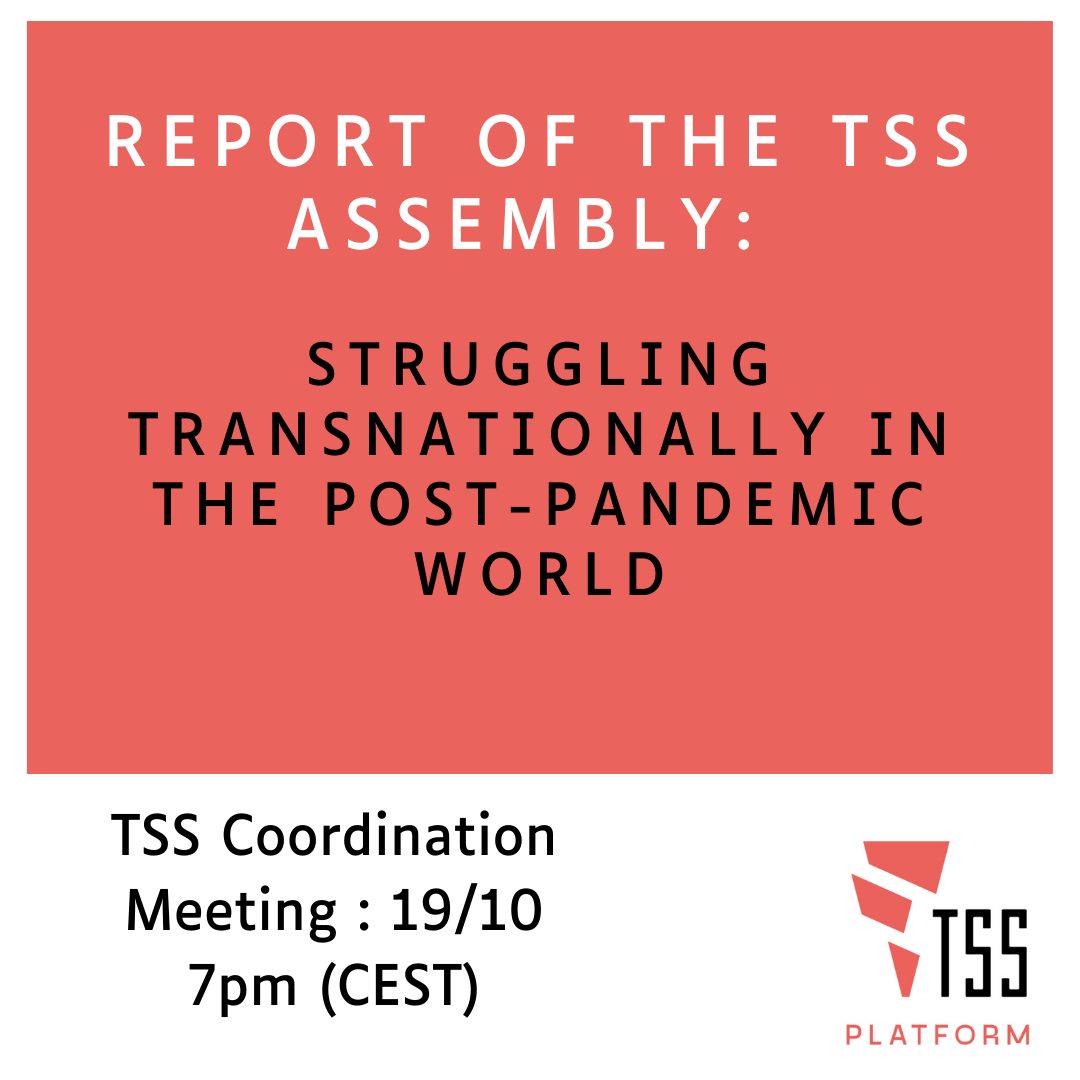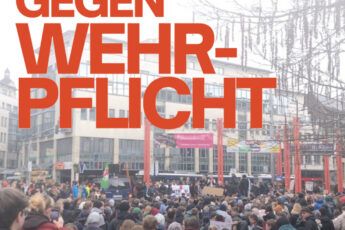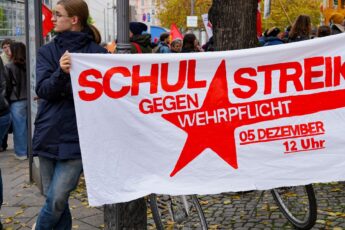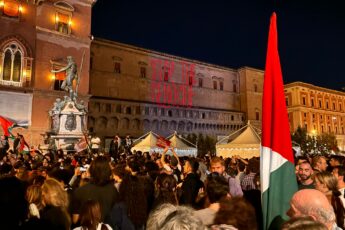
Watch the video of the assembly here.
On Sunday October 3rd activists, unionists and migrants from Georgia, Polonia, Bulgaria, Romania, Lithuania, Italy, France, Germany, Greece, Sweden and UK met online as part of the TSS assembly to discuss how to intervene transnationally in the post-pandemic reconstruction.
We recognized the need to share a common analysis of the ways in which the recovery plans from the pandemic will transform working relations and welfare. These policies and EU criteria are presented as a sort of necessity where no alternative is possible. We need to build a common understanding on how each plan responds to logics that are not simply national. While the plan is discussed in every country as a national issue regarding national reforms or investments, in fact, national governments are agents of transnational processes. Furthermore, the EU has the clear aim to consolidate a differentiated geography of Europe, relying on a non-disputable hierarchy between East and West. Precise hierarchies are being established also between the EU and the countries at its borders, such as the UK, Georgia, Turkey and North African states.
In the assembly we discussed some crucial aspects of the recovery plans. The first one is the impact of the green transition on working conditions, welfare and housing. The conversion of industries comes together with the justification of the layoffs of thousands of workers. The emphasis is placed on the relocation, upskilling and reskilling of workers, so that, on the one hand, unemployment becomes a matter of individual responsibility and, on the other, it is the excuse to introduce low paid training programs or more precarious employment conditions. This process is not limited to the EU recovery plans but is also at the center of reconstruction policies in countries such as the UK.
Under the umbrella of the green transition, projects of energetic rehabilitation of public housing buildings risk to cause mass evictions and establish a hierarchy between “green” housing for better off people and second-class public housing for those who need it the most. Big investments in ecological renovation will result in less welfare support. At the same time, in Central and Eastern European countries like Romania governments are pledging to use public money not so much to improve public welfare, but rather to finance and support private institutions or NGOs thus further privatizing health care, social work and social service. We risk going out of the pandemic with the worst healthcare systems and with even less accessible public welfare despite all the money that will be spent.
Together with the need to re-skill workers, governments denounce labor shortage and say that migrants need to fill the gaps and provide labor for the big infrastructure projects included in many recovery plans. The very realization of the recovery plans relies on the supposed availability to work at whatever conditions of hundreds of thousands of migrants with temporary residence permits, that should be hired and then dismissed when they are not needed anymore. They should work but not be endowed with any right to stay and to obtain welfare benefits in the hosting countries. Recruitment agencies are at the center of this exploitative mobility regime.
The free movement of migrants is so much contrary to the plans for the post-pandemic reconstruction that this goes hand in hand with the erection of fences and walls on the EU borders. Faced with the reality of becoming a country of first arrival, Polish authorities are accusing Belarus and Russia to be orchestrating massive migrants’ arrivals in the EU. The state of emergency declared by Poland, which has already caused several deaths, heralds further tensions for the months to come, with the likely increase in the arrivals of migrants from Afghanistan. The EU has been relying on the authority of other States to keep migrants outside its borders, like Turkey, Libya, Pakistan and Iran, and other bordering states who are enacting violent pushbacks. It is one more way in which a transnational process is disguised in national clothes. What is happening now in Poland reproduces dynamics seen before in Greece, Italy, Spain and the Balkans. Against this we said that racist violence at the Polish borders is European violence. Only the capacity of migrants and social movements to build a transnational collective voice against this violence and for a European unconditional residence permit can effectively challenge it.
During the first phase of the pandemic, and especially with national lockdowns, an increased transnational communication took place, whereas now we are seeing a national retreat of struggles. While many experiments are keeping alive the transnational projection on crucial terrains – such as EAST, Transnational Migrants Coordination and the struggle for a European residence permits, riders’ struggles and Amazon Workers International –, as TSS we have the task to build a space of communication, analysis and organization able to go beyond the national dimension and have a say on the conditions of the post-pandemic reconstruction.
To build a transnational political perspective that is able to target at the same time national governments, supranational institutions and companies we need to respond to many questions: what common demands can we elaborate? To whom are we going to address them? How can we overturn the logic according to which the decisions on where and how the money is spent are presented as uncontestable? How can we organize at the level of the processes we face and express a transnational force? How can we unite the forces of the fragmented struggles we are in to engage in a common project?
After the October 3rd assembly we will continue posing ourselves these questions, articulating common discourses and organizing thematic workshops around the most relevant and contested topics of the post-pandemic reconstruction. These workshops will compose a transnational roadmap leading us to organize a physical meeting in Sofia, Bulgaria in the spring/summer 2022.
The next appointment is our monthly coordination meeting Tuesday October 19th at 7pm (CET), when we will talk about how to organize further discussions. If you want to take part, please write an email to info@transnational-strike.info





